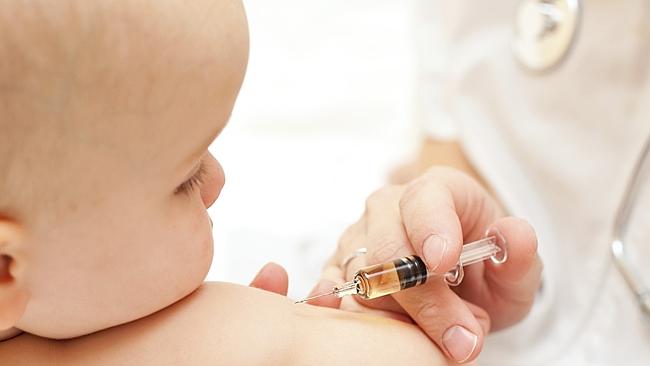
Authorities say the alarming spike in measles last year and a current whooping cough outbreak highlight the importance of increasing vaccination rates. Source: Getty Images
HOSPITAL emergency department staff are being urged to help lift Queensland’s immunisation rate by targeting parents of unvaccinated kids.
Latest figures show the rates of fully immunised children in Queensland have improved slightly in the past year but are still short of the national target of 95 per cent.
NEW TECH: Needle-free vaccines coming
Authorities say the alarming spike in measles last year and a current whooping cough outbreak highlight the importance of increasing the rates.
“The vaccination rates in Queensland are generally good and on par with other states and territories,” Queensland’s Chief Health Officer Dr Jeannette Young said.
“However there is always more that can be done to boost these rates and further protect our community from preventable diseases.”
About 90 per cent of toddlers between 24 and 27 months were fully vaccinated, the Australian Childhood Immunisation Register shows.
Almost 92 per cent of children aged 12-15 months, and five years, were fully immunised.
The State Government’s vaccination strategy released last year to achieve “herd immunity” to protect newborns and vulnerable people has helped raise the rates but authorities are continuing to investigate ways to reach parents and children who have limited contact with the health system.
An article published in the Australian and New Zealand Journal of Public Health this week called on governments to make greater use of “opportunistic vaccinations”.
Health Minister Cameron Dick said he supported “opportunistic vaccinations”, a practice included in the Department of Health’s guidelines, and encouraged staff to use the strategy to “ensure our community is protected”.
The report’s co-author, Blake Dawson, said immunisations should routinely be offered to unvaccinated children when they visit hospital emergency departments.
Dr Dawson, of the Gold Coast University Hospital, examined the reasons why parents decline measles vaccinations and said they were deterred by more than a misplaced fear of their child developing autism, a theory that has been discredited by research.
“You can cast the net wider and allow greater vaccination and you can vaccinate people who might not otherwise engage with healthcare,” he said.
“Opportunistic vaccination is an area that’s talked about but it’s not in widespread practice.’’
